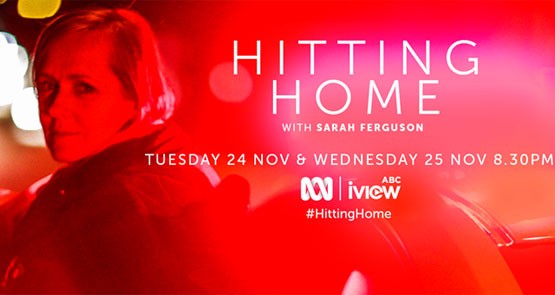
Hitting Home, a two-part series on domestic violence on the ABC starting tomorrow night, tells, on at least one level, a very simple story. Several women talk on camera about their experiences of domestic violence. “Can you imagine something more straightforward?” the series’ host, Sarah Ferguson, muses. But filming Hitting Home was anything but easy.
While domestic violence has been in the headlines for much of the past few years, long-form, multi-faceted stories about it on television are rare. The legal restrictions around filming victims, perpetrators and children are considerable.
“We got legal advice from the ABC, but the production company spent a lot of money seeking to find a way through the restrictions,” Ferguson told Crikey last week. “And frankly, hardly anybody else would have done it. Most people, faced with these restrictions and costs, would have walked away from this story. It took a great effort from the production company and the full effort of the ABC to enable us to do it.”
Ferguson embedded herself in a refuge in New South Wales for women fleeing domestic violence for several months. During the first episode she follows a woman through the legal system as police bring assault charges against her former partner. She talks to another woman even earlier — on the afternoon she first gives a statement about a brutal assault to police and as her fresh bruises are examined by a forensic doctor.
“Currency is what makes stories powerful,” Ferguson said. “The immediate, shallow breathing is there, the nervousness, anxiety, the presence of human experience. But in the present, every legal problem you could have is there. You accept that’ll be part of your storytelling.”
In Films, which produced the series, left the legals up to defamation barrister Sandy Dawson and director Ivan O’Mahoney. The solutions Dawson and O’Mahoney came up with are everywhere throughout the documentary. Children are a constant presence. They are pictured playing, engrossed in activities or speaking about their experiences of domestic violence, but their faces are never shown — they are filmed from behind, or when from the front, their faces are blurred. Including children in the series further complicated what stories could be told. Special leave had to be sought (and was granted) to discuss one case, as a child was present during the assault.
Children and the laws around filming them were not the only complication. Many of the women in the refuge and others are still in hiding, fearful for their lives. So as they speak, the camera focuses on their clenched hands. In some cases, photographs of wedding photos and the like are used to illustrate what appeared to be happy relationships.
One subject, Ben, is sentenced during the filming of the documentary, so his wife Isabella’s story can be told with relatively fewer restrictions than many of the other cases (though her son’s face is still never shown). Ben is clearly pictured in wedding photos displayed on screen, but when Hitting Home secured permission to film in court during his trial, he could not be shown. No creative camera angle is used here — he is filmed, but his face and identifying features are blurred.
Ferguson is reluctant to condemn the legal restrictions around filming this kind of thing, saying they are there to protect children. She notes the courts, police, shelters and women themselves were very keen to work with the series to find a way to tell the story regardless. But she concedes legal restrictions hamper this style of reporting.
“We should be able to speak plainly to one another about these issues,” she said. “So it’s a tension. You want to protect children into the future. But by the same token, many mothers decided they wanted to tell their stories. That helped them reassert control over their own lives. And they, and we, really hoped these stories would resonate with people in similar situations and relationships.
“My view is, if you can find a way to enable people to tell their stories, it’s frequently a very good thing.”








You’re talking about irrelevant costs, Myriam. The ABC/SBS duo are looked after extremely generously using taxpayers money which can always be diverted from programmes actually improving what happens in our Nation, as opposed to programmes which can be relied upon to exacerbate whatever negative emotions are harming our way of life.
Protecting the victim is paramount, as is protecting the accused until he or she is actually convicted. We as viewers don’t have a right to know everything even if it makes the presentation more compelling. We just need to know enough. An adult can decide to go public with their story but a child cannot.
Oh Myriam, oh, oh. Ok, alright. All men are wife bashers and rapists, right? Wrong, but never underestimate the power of social engineering.
I wonder who financed the docco? Programmers: “We’ll give this one to Fergy. She has n’t been doing much lately and obviously needs the money and attention. Yeah, Fergy will do it and won’t cost us much either.”
My comment is waiting moderation over what?
John, you’re overlooking the fact that the Crikey Commissariat often react as a naïve child would. They’re not of course children even if they sometimes act as if they were.
On the other hand, some of my acquaintances with a background in psychology find their behaviour particularly interesting. My work led me to deal with patients at Ryde Psychiatric Centre back in the 1960s, and I not infrequently see reactions from the Crikey Commissariat which remind me of the fascinating patients I interviewed then.